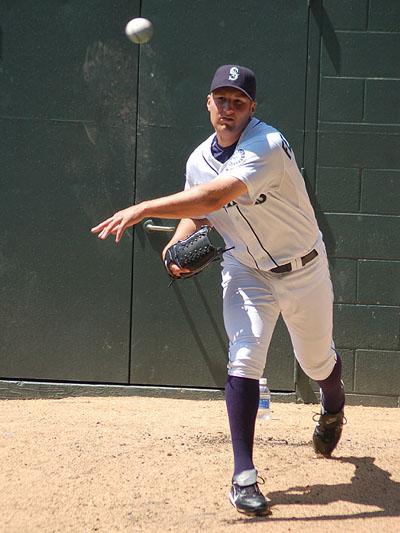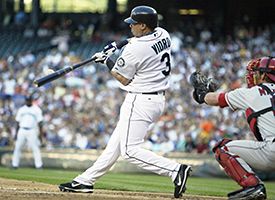
Last year was the first under Major League Baseball's new rules for signing draft picks. It used to be that clubs had until one week prior to the next draft to sign their draftees. Now, the deadline is August 15, over 9 months earlier than what it used to be! Despite a drastically earlier deadline, every first round pick signed last year.
I did not think everyone would sign in 2007, I am even less confident about the 2008 crop. Too many remain unsigned with less than 12 hours before the deadline approaches, including a whopping 6 out of the top 10. Here are all the remaining unsigned first-round picks, with the rumors I am hearing, and my gut feeling on whether they will sign or not.
Pedro Alvarez, 3B, Pirates (2nd overall) - If you could not tell from Pittsburgh's deadline deals, their top priority right now is replenishing their farm system. On top of that, they have a bad rap the last couple years of being unwilling to shell out the big money for big-time prospects. While trying to work out a deal for Alvarez, the Pirates have also been trying to assess the arm strength of their second-round pick, RHP Tanner Scheppers, to determine if they want to sign him, and for how much. The bottom line is that the Pirates have way too many reasons that they need to sign Alvarez, and it is doubtful Alvarez will earn much (if any) more money by returning to school. I think
he will sign.
Eric Hosmer, 1B, Royals (3rd overall) - Eric, a high-schooler, has a full-ride scholarship to Arizona State and Scott Boras negotiating, two big reasons to think he will not sign. But, ultimately, this is eerily similar to the situation the Royals had last year with Mike Moustakas. They got him signed, so I think
Hosmer will sign too.
Brian Matusz, LHP, Orioles (4th overall) - Rumors are that the two sides are close to an agreement as I write this. The 2009 draft pitching crop looks strong right now, so the odds of Matusz getting more money next year are slim. On top of that, Baltimore has all their other picks signed (that are going to sign), so they have the luxury of completely focusing on this deal at the deadline. It is safe to say that
Matusz will sign.
Buster Posey, C, Giants (5th overall) - There are also rumors this morning that the two sides in these negotiations are close to a deal. Posey has been asking for a ton of money, and it will be interesting to see what kind of perks his deal includes. I have a hunch he will get a guaranteed major-league contract, which is a major perk. Even though these negotiations look like they have been tough, Posey maximized his draft stock with the epic year he had, and the Giants desperately need position players in their farm system. The high mutual interest in getting this deal done is why I say
he will sign. Interestingly, the Giants are yet to sign several of their higher picks, and at this point they may not have enough time to work out contracts with all of them. How quickly this deal falls in place today could be crucial to the team's ability to sign their other remaining picks.
Yonder Alonso, 1B, Reds (7th overall) - Scott Boras is going to be a busy man today, as (surprise) a significant number of the picks on this list are his clients. Alonso is one of them. The rumor is that the Reds are offering a slot-level contract to Yonder (MLB has a slotting system for draft pick contracts like the NBA, but it's only a suggested contract in MLB), but he wants twice that. Alonso has also stated that he would be perfectly fine with going back to Miami and finishing out his college career, which I do not think is a bluff. He has steadily progressed, and it is fair to think that he could be drafted this high next year, if not higher. From the Reds stand-point, there is not a massive need to budge on their rumored offer either, since they already have a young first baseman in the majors in Joey Votto. This is one pick that I think
will not sign.
Aaron Crow, RHP, Nationals (9th overall) - The Nationals are offering Crow a contract similar to the one they signed Ross Detwiler to a year ago. Considering Detwiler was selected a few slots higher last year, that is a plenty fair deal. However, Crow wants a ton more. Washington could really use some pitching, and frankly Crow probably only went this high because it was a down year for pitching prospects. It is only logical that Crow will sign, but there is also a report that he has already signed with an independent league team, which may trump reasoning in this case. That is enough for me to say that
Crow will not sign.
Justin Smoak, 1B, Rangers (11th overall) - Smoak could have been a high draft pick coming out of high school, but his commitment to South Carolina was way too strong. So, he probably would not have a huge problem returning to school. The popular thinking is that Smoak is waiting to see how much Alonso gets. However, I don't think Alonso is going to sign. I have no idea what that would do to these negotiations. Texas is not exactly hurting on offense, and Smoak probably would have gone higher in a draft with average depth at first base. Still, despite all that, I will go on a true gut feeling with minimal reasoning to back it up. I'm going to say that
Smoak will sign.
Josh Fields, RHP, Mariners (20th overall) - Nobody can figure out why Fields has not signed yet. He is a college senior, so he cannot go back to school. Rumors are that the Mariners have offered a contract right in line with his slot too. Fields even said on draft day that he was looking forward to getting in the organization and pitching right away, with some thinking he could reach the majors by September. Obviously, that is not going to happen. This deadline actually means nothing for this pick, thanks to an odd loophole in the rules. Since Fields is a college senior, the Mariners have until a week before next year's draft to sign him, meaning there is no real urgency to get the deal done now. Considering Scott Boras is his agent, and he is going to be busy with plenty of other clients today, I would think that this deal will be the last priority today. Ultimately,
Fields will sign...but not today
Allan Dykstra, 1B, Padres (23rd overall) - It looked like Dykstra was close to signing a while ago, but then the Padres found something in his hip from high school that bothers them. It looks as if it bothered them enough to drop their offer, and obviously Dykstra is yet to take it. Another big year at Wake Forest could vault Allan up in the draft, especially with a crop of first-baseman that is bounder to be weaker than this year's. It looks to me like
Dykstra will not sign.
Gerrit Cole, RHP, Yankees (28th overall) - This has all the making of a classic last-minute, maximum-leverage, Scott Boras deal. Boras is looking to sign Cole to a contract similar to the one he got for Rick Porcello last year. On the surface, it seems fair. Porcello was the 27th pick last year and was one of the best high school arms in the nation, much like Cole. However, Porcello fell solely because of signability issues, meaning the team that eventually took him (the Tigers) went well beyond the slot recommendation for a 27th pick to sign him. Cole is nowhere near as polished as Porcello, and so the Yankees are rightly holding their ground. In the end, New York has the money, Boras is simply trying to maximize the contract he can get for Cole, and I have a hard time believing Gerrit will turn down a chance to wear the fabled pinstripes.
Cole will sign.
History says that virtually all first-round draft picks sign these days. Teams do too much scouting and sink too much money in the draft now to be completely surprised by a player's demands, or be unwilling to pay a little more than they wanted to. Plus, from the prospect's standpoint, how easy is it to turn down millions of dollars? It is safe to assume the deal will get done when it comes to baseball prospects. But, it sure seems like there are too many deals to get done in a few hours this year.
 As the losses mounted in the most recent losing streak, I wondered if I could find anything good to say about the Mariners these days. Sure, bad teams lose, but nobody should get blown out night after night after night. The pitching staff especially looked completely over-matched. It is one thing to be bad; it is another to not belong in the same league.
As the losses mounted in the most recent losing streak, I wondered if I could find anything good to say about the Mariners these days. Sure, bad teams lose, but nobody should get blown out night after night after night. The pitching staff especially looked completely over-matched. It is one thing to be bad; it is another to not belong in the same league.







